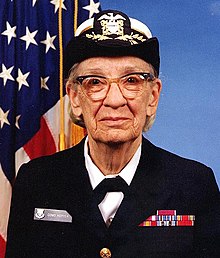In the article “Grace Hopper - The Mother of
Cobol” as well as in the documentary “The Queen Of Code”, the feats of the late
computer scientist and stereotype breaker Grace Brewster Murray Hopper are
told. An inspiring story of a woman who not only was outstanding at her male
driven area, but also helped develop some of the most used and advanced
software techniques to date, such as compilers. It is incredible to think that
the term “bug”, the idea behind compilers, and the programming language Cobol
could all have their inception in such a magnificent individual. It is hard to
decide which is more impressive, her accomplishments, or the fact that she did
it all while being a woman in the field. Similar stories are met with different
outcomes, such as Alan Turing’s who was in the end, shunned and mistreated as a
result of his sexuality. And while one’s sex might have been perceived a little
different in such war times, it is still something to be admired to thrive even
when the odds are against you.
She DOES look kinda iconic, there should definitely be more merchandise
It would seem it is always important to have a
women’s touch when it comes to science. Who would have suggested writing code
in a similar language to English other than a woman who sees beyond the
established methods and truly pinpoints the requirements of a group of people? Such
people are hardly heard of in our field. It is sad to think people admire Steve
Jobs over such an influential woman. Certainly, the ferocity and dedication of
such a person should be celebrated, and it brings me joy to think there are
events and high esteemed prizes named after Grace Hopper. Hopefully, her story Is
motivational for men and woman in computer science alike, so that her legacy
and idea live on. Cheers to the original grandmaster dragon slayer, Grace
Hopper.
She might not look like much, but she was basically THE OG Grandmaster Dragon Slayer
Sources:
Historian. 2013. "The Mother of Cobol". Retrieved 26 of February 2017 in: http://www.i-programmer.info/history/people/294-the-mother-of-cobol.html
McCann, A. 2015. "The Queen of Code". Retrieved 26 of February 2017 in: http://fivethirtyeight.com/features/the-queen-of-code/


